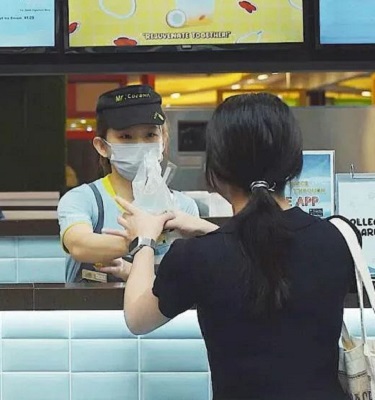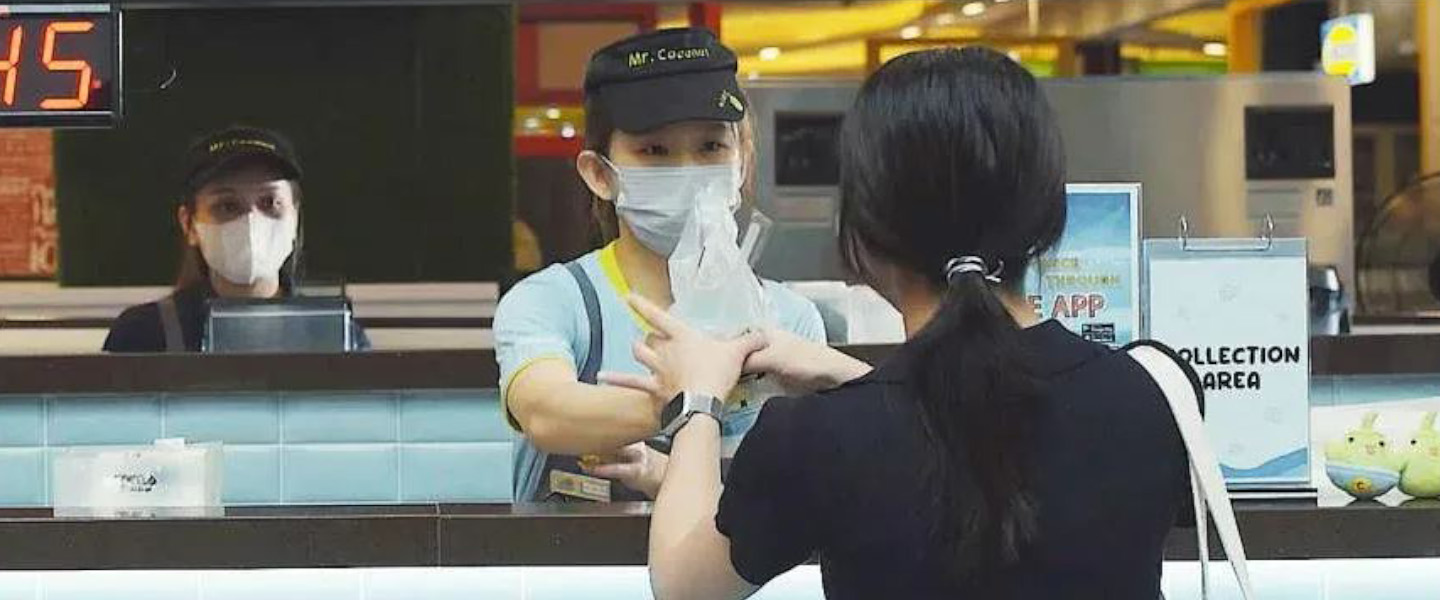You are now reading:
Enabling SMEs' expansion: real-time cash flow and operations management
1 of 3



Starting or growing a business? Enjoy more than S$4,000 savings now with essential solutions. T&Cs apply.
Find out more
Your go-to sustainability guide. Get your customised report today by taking the quiz now.
Take the quizyou are in GROUP WHOLESALE BANKING


You are now reading:
Enabling SMEs' expansion: real-time cash flow and operations management
From working capital loans to loans tied to specific projects such as setting up a central kitchen, local bank UOB has been a key partner in helping F&B business Mr Coconut grow from a single outlet in 2016 to 40 kiosks and stores across Singapore today.

F&B business Mr Coconut grew from a single outlet in 2016 to 40 kiosks and stores across Singapore today with the help of UOB's digital solutions. PHOTO: UOB
Mr Coconut, a popular coconut-themed drinks and desserts chain found in many shopping malls here, looks to UOB not just for banking services.
UOB also provides a wide range of supporting services – from an app that allows Mr Coconut’s owners to view cash flows and bank balances in real time to a platform that identifies digital solutions suitable for small and medium-sized enterprise (SME) clients.
When Mr Coconut decided to shift to a cashless payment system, it tapped UOB’s working capital solutions to set up a central kitchen that automates its processes and to digitalise its payment tools, freeing up manpower both on the front and back-end.
Mr Coconut is also currently working with UOB on various credit card promotions to increase its profile and boost sales in Singapore’s extremely competitive food and beverage market.
Mr Lucas Lin, head of marketing and business development at Mr Coconut, says: “It’s important to us to maintain a close working relationship with our bank, UOB, as they offer financial advice that influences our strategic business decisions and expansion plans. This helps us plan for future growth whilst remaining financially stable.
“We are also exploring ways to upcycle the coconut shell waste generated from our stores daily and will look to our strategic financial partner to advise us on suitable sustainable solutions and financing packages that we can implement.”
UOB has been partnering small businesses since its founding in 1935.
Mr Lawrence Loh, head of group business banking at UOB, says SMEs are an important sector not just for UOB, but also for Singapore and the rest of Southeast Asia.
“As the One Bank for Asean, UOB continues to support SMEs in building resilience through insights and solutions, as they adapt their businesses to face macroeconomic challenges. We have learnt, especially from recent years, that business agility is critical for SMEs to stay relevant and competitive globally”
MR LAWRENCE LOH, HEAD OF GROUP BUSINESS BANKING, UOB
Across Asean, SMEs account for some 95 per cent of enterprises and contribute to around 75 per cent of total employment. By helping SMEs build resilient businesses, UOB contributes to the future of Singapore and the region.
He says: “We are continually finding out what our SMEs are looking at, and what stress points they are currently facing.”
Last year, UOB launched the UOB SME app in Singapore, Malaysia and Vietnam that enables customers like Mr Coconut to monitor their cash flow in real-time, using an interactive dashboard.

SMEs are an important sector for Singapore and the rest of Southeast Asia, says Mr Lawrence Loh, head of group business banking at UOB. PHOTO: UOB
Other features in the UOB SME app, which connects customers to a range of bank products and services, include the ability to transact foreign exchange at favourable rates with the help of personalised watchlists and alerts.
To help SMEs achieve improved business efficiency, UOB also launched UOB BizSmart in 2016 – a suite of curated digital solutions that customers can use to better manage operations from payrolls and logistics to online transactions, e-commerce and marketing.
“Today, UOB has over 50 industry partners across Asean markets catering to the specific needs of businesses in each industry,” Mr Loh says.
Mr Loh says digitalisation has strengthened the capabilities of many of its SME clients by lowering their costs while enhancing customer service and reaching new customer channels.
One such client is Music Gear, which imports and sells wind and percussion musical instruments. UOB had helped Music Gear improve its FX hedging process, protecting it from the volatility in currency markets. With an FX solution implemented, Music Gear was able to control their costs when trading goods using foreign currencies, without worrying about unforeseen fluctuations in exchange rates.

Digitalisation has strengthened the capabilities of Music Gear, which imports and sells wind and percussion musical instruments. PHOTO: UOB
According to the UOB Business (SME & Large Enterprises) Outlook Study 2023, which polled over 800 businesses in Singapore, the top three concerns among SMEs are coping with inflation, digitalising their operations and expanding abroad.
The recent Singapore Budget 2023 addresses many of these concerns through initiatives such as the Enterprise Financing Scheme (EFS), which has been extended for a year to facilitate SMEs’ continued access to credit. Under EFS, the government, via Enterprise Singapore, will share loan default risks with participating financial institutions like UOB. SMEs can get up to $500,000 in unsecured working capital loans from UOB and Enterprise Singapore, but UOB is prepared to offer up to $800,000 to help companies as they gear up for increased business activities, with the economy reopening.
The measures announced in Budget 2023, says Mr Loh, will provide SMEs with a stable foundation and some assurance in an increasingly volatile global economy.
As part of its commitment to serving Singapore’s SME sector, UOB works closely with government agencies and business leaders to provide customers with both financial and non-financial solutions.
Mr Loh says: “As the One Bank for Asean, UOB continues to support SMEs in building resilience through insights and solutions, as they adapt their businesses to face macroeconomic challenges. We have learnt, especially from recent years, that business agility is critical for SMEs to stay relevant and competitive globally.
“This is why we support SMEs closely through an evolving, hybrid banking experience, to keep pace with their increasingly complex business needs.”
This article was originally published in The Straits Times on 5 April 2023.

Start your UOB eBusiness account today, and enjoy zero fees* and more than S$500 of annual savings on FAST and GIRO transaction fees.

17 Sep 2025 • 5 mins read

26 Oct 2022 • 3 mins watch time

19 Jul 2022 • 4 mins read